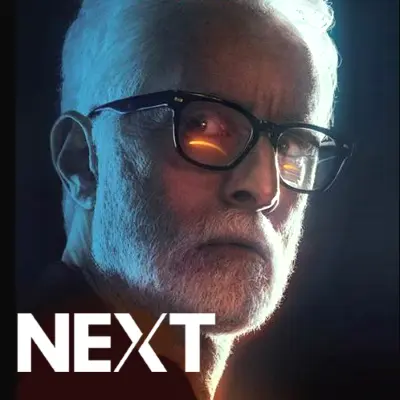Fox's NEXT might have felt prescient years ago, but now it kind of feels outdated
-

"For a show with a forward-looking title, Fox's new drama NEXT arrives this week feeling unexpectedly retro," says Daniel Fienberg of the John Slattery-led series created by Manny Coto. "Our unsteady current moment has provided plenty of cause for sleepless nights. It isn't that malevolent artificial intelligence has ceased to be a cause for concern, but on my own list of personal nightmare fodder, it has fallen comfortably behind such preoccupations as a global pandemic, ongoing inequities in the justice system, a ticking clock on climate change, a contentious presidential election and the inevitable comeback of the murder wasps. It's bizarre, but even since I first watched the NEXT pilot back in January (critics have now gotten five episodes of what is being called an 'event series'), NEXT has transitioned from being a peripherally timely show to a trailblazer in what might almost be a new genre: Escapist paranoia. NEXT exists in an almost hermetically sealed bubble where even if you know that its warnings are probably grounded in something plausible, it feels no more real or substantive than Bigfoot or a vampire."
ALSO:
- NEXT is the network TV equivalent of those solid mid-budget thrillers slowly disappearing from multiplexes: "Even factoring in a few choices that feel out of step with certain online realities (when was the last time viral cellphone footage had full shot/reverse shot editing?), it’s impossible to ignore the way NEXT taps into anxiety, specifically in seeing people try to track an effectively invisible killer," says Steve Greene. "The idea of containing a potential lethal force in fits and starts without fully understanding how it spreads is terror enough; LeBlanc and Salazar don’t need to do much more than invoke it to give the show dramatic drive. NEXT is the network TV equivalent of those solid mid-budget thrillers slowly disappearing from multiplexes. Effectively managed in scale and scope, while utilizing some of its own limitations, NEXT gets plenty of mileage out of not overburdening its protagonists. So far, they’re not asked to be action heroes — the excitement is built on intuition and instinct rather than brute force."
- NEXT becomes a surprisingly effective horror thriller, but it would be better off it were more streamlined: "As a whole, NEXT moves appealingly quickly," says Caroline Framke. "Using the basics of procedural plotting to make each episode distinct unto itself, the show keeps forcing Paul and Shea to chase new leads and destructive internet avenues neXt can take. And yet, after watching five of the ten episodes, it’s hard to say what exactly neXt’s end goal actually is beyond making everyone’s lives hell. On the one hand, this makes some sense, because neXt is the enemy that needs decoding. On the other, the question of what neXt actually wants to do with its newfound power remains nebulous for far too long. Whether a person or a nefarious AI system run amuck, a villain who wreak havoc just because it can is the least interesting kind of villain."
- Slattery's unflappable presence makes NEXT feel lighter and less chewy: "If the show is offered as an ominous warning about the threat of omnipresent technology in the manner of Black Mirror, what it achieves is something far lighter and less chewy," says Glen Weldon. "That's likely due, at least in part, to Slattery's unflappable presence. Seriously — nothing flaps this guy. So even as his character goes around smashing cellphones and smart thermostats and car navigation systems while delivering dark pronouncements about the end of the human race, you can't help but think, Look at this guy. He's got this covered. We'll be fine."
- NEXT is an A.I. thriller that lacks self-awareness: "With the exception of a Skynet joke in the second episode, the series takes its subject matter very seriously, even when Next’s actions are particularly silly, like spreading office gossip or delivering petty insults," says Josh Bell. "The dialogue alternates between incomprehensible technobabble and convenient oversimplifications (Paul calls Next’s abilities an 'intelligence explosion'), and Next is a poorly defined adversary, doing whatever the plot requires at any time, often without clear motivation. It’s a seemingly omnipotent and omniscient foe that can take over an Alexa-like device to manipulate Shea’s young son, open the doors of a prison in Honduras, or turn off a car in the midst of the owner’s suicide attempt. Next’s absurd level of power makes the A.I. dramatically ineffective as a villain, and it doesn’t have any kind of personality or voice to allow it to develop an antagonistic relationship with the human characters."
- John Slattery mixes Roger Sterling’s smooth and funny and snarky charm from Mad Men with next-level doses of Elon Musk/Steve Jobs eccentricity
- John Slattery says it's fun to play an "erratic and difficult and irascible" character: "I looked at all the usual suspects — Bill Gates, Elon Musk — and then just kind of filed it all away," Slattery says of preparing to play a billionaire in advance. "A lot of (the show) wasn’t written in advance; I didn’t have a lot of information to go on. So, you take a stab and you make some adjustments and you play things different ways. I don’t know that much about the tech side of it. It still isn’t in my bones as much as I would like. And also, playing someone that smart, most of the time they’re not interested in impressing you with how smart they are. They already know they’re smart."
TOPICS: NEXT, FOX, John Slattery, Manny Coto
